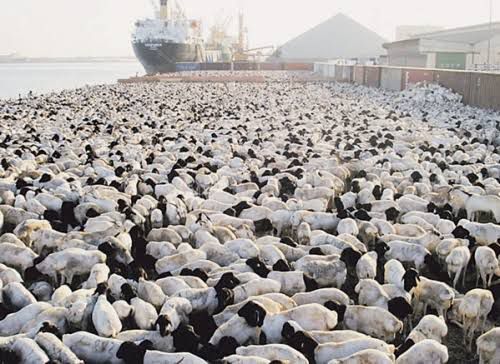Ahmed Hassan Hafiz, Chairman of the African Livestock Importers Association: Egypt Signs New Deals for Immediate Slaughter of Goats and Sheep from Somalia and Djibouti
في يوم 4 أغسطس، 2024 | بتوقيت 1:50 م

كتب: BY Fathy Elsayeh
In a strategic move aimed at countering rising lamb meat prices in the Egyptian market, Egyptian companies have announced the signing of new deals with Somalia and Djibouti to import large quantities of goats and sheep for immediate slaughter. Ahmed Hassan Hafiz, Chairman of the African Livestock Importers Association, stated that these deals are part of the efforts to balance local market prices and ensure the availability of affordable meat, especially with the approach of the holy month of Ramadan.
Hafiz explained that current prices for goats and sheep range between EGP 200 to 230 per kilogram. He noted that local consumption of lamb and goat meat has significantly increased due to the rise in the number of expatriates and tourists in Egypt, particularly from the Gulf region. This increased demand for red meat has put pressure on the local market, leading to higher prices and prompting Egyptian companies to seek sustainable solutions to this challenge.
Hafiz pointed out that the expected quantities to enter Egypt monthly from Somalia and Djibouti range between 15,000 to 25,000 heads of goats and sheep. These will be brought in through the Safaga area, where veterinary quarantines under the Ministry of Agriculture are ready for immediate slaughter. This step will greatly contribute to providing consumers with reasonably priced meat and help bridge the gap between local production and consumption.
Hafiz emphasized that the Egyptian government supports these efforts by providing the necessary facilities for meat imports. He praised the roles of the new Minister of Agriculture and the Minister of Supply in facilitating import procedures and ensuring the swift arrival of imported quantities to the market. He added that Egypt’s annual meat consumption is about 2.5 million heads, reflecting the urgent need to bridge the gap between local production and consumption, which is no less than 30%.
To achieve this goal, Hafiz called for an increase in the number of veterinary quarantines in Egypt to accommodate the large quantities of imported livestock. These quarantines play a vital role in ensuring the quality and safety of imported meat and help expedite slaughter and distribution processes.
Hafiz concluded his remarks by asserting that these new deals will significantly contribute to stabilizing prices of lamb and red meat in general in the Egyptian market, benefiting Egyptian consumers and helping stabilize the market in the coming periods.
This move is part of ongoing efforts to enhance food security in Egypt and ensure the availability of high-quality, reasonably priced meat through strengthened cooperation with friendly African countries such as Somalia and Djibouti, which are key sources of livestock supply. The continued efforts and fruitful cooperation between the public and private sectors will positively impact the Egyptian economy and the living standards of its citizens.















